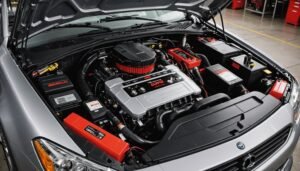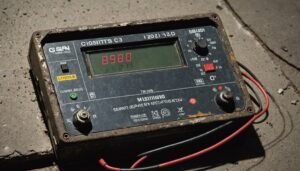If you’ve ever found yourself stranded with a dead battery, you understand the urgency of knowing how much a new one costs. Prices can vary widely, from around $50 for standard batteries to over $500 for specialized options. But why such a difference? Understanding the factors that influence battery prices—like type, installation costs, and warranties—can help you make an informed decision when it’s time to replace yours.
Key Takeaways
- Standard car batteries typically range from $50 to $150, depending on brand and capacity.
- Specialty batteries, like AGM and lithium-ion, can cost between $150 and over $500.
- Installation costs may vary; DIY can save money but risks additional expenses if mistakes occur.
- Battery prices are influenced by factors like brand reputation, chemistry, and local market dynamics.
- Regular maintenance and monitoring can help avoid unexpected battery failures and related costs.
Types of Car Batteries

When you’re shopping for a car battery, it’s crucial to know the different types available, since each serves specific needs and vehicle requirements. The most common type is the lead-acid battery, which can be either conventional or maintenance-free. Conventional batteries require regular checking of fluid levels, while maintenance-free batteries offer a sealed design, reducing the hassle.
Another option is the absorbed glass mat (AGM) battery, known for its durability and resistance to vibration. AGM batteries are often used in luxury vehicles and those with high electrical demands. Then, there’s the lithium-ion battery, becoming popular due to its lightweight design and longer lifespan, particularly in electric vehicles.You can learn more about how-many-volts-is-a-car-battery
Lastly, deep-cycle batteries are designed for applications requiring sustained power over longer periods, like RVs and boats. Understanding these types will help you choose the right battery to guarantee ideal performance for your vehicle.
Factors Affecting Car Battery Prices

Choosing the right car battery involves not just understanding the types available but also recognizing the various factors that influence their prices. First, brand reputation plays a significant role; well-known brands often cost more due to their reliability and warranty options. In addition, the battery’s chemistry affects pricing as lead-acid batteries generally cost less than lithium-ion alternatives, which offer advanced performance.You can learn more about how-to-disconnect-car-battery
Manufacturing technology also impacts prices; batteries made with newer tech might carry a premium. Size and capacity are essential—larger batteries with higher cold-cranking amps (CCA) can be pricier due to their ability to start engines in colder conditions. Moreover, environmental considerations, such as recycling and sustainability, have begun to influence costs. Finally, local market dynamics, including demand and supply fluctuations, can lead to variations in pricing. Understanding these factors can help you make an informed decision when selecting a battery that fits your needs and budget.
Average Cost of Standard Car Batteries

The average cost of standard car batteries typically ranges from $50 to $150, depending on various factors like brand, size, and capacity. When considering your purchase, it’s essential to weigh these factors to guarantee you’re making the best decision for your vehicle. Here are four key elements affecting the price:
- Brand Reputation: Well-known brands may charge more but often deliver reliability.
- Battery Type: Standard lead-acid batteries might be cheaper than absorbed glass mat (AGM) types.
- Capacity: A higher capacity battery will usually cost more, reflecting its ability to power your vehicle.
- Warranty: Batteries with extended warranties tend to have higher upfront costs but can save you money long-term.
Specialty Batteries and Their Prices
For vehicles with special requirements or enhanced performance needs, specialty batteries offer tailored solutions, albeit at a higher price point. These batteries, such as AGM (Absorbent Glass Mat) or lithium-ion, are engineered to meet the demands of high-performance applications, starting in vehicles with advanced electronics or those used in extreme conditions. Prices for these batteries can range from $150 to over $500, depending on brand, specifications, and capacity.
AGM batteries, for instance, provide superior durability and are often about 20% more expensive than conventional lead-acid options. If you’re driving a luxury car or need a reliable source for frequent starts, investing in a specialty battery is crucial. Lithium-ion variants, while also offering lightweight and efficiency advantages, can be even pricier due to advanced manufacturing processes. Ultimately, aligning your vehicle’s demands with the right specialty battery guarantees peak performance and longevity.You can learn more about how-long-does-a-car-battery-last
DIY vs. Professional Installation Costs
While you may feel confident tackling the installation of a new car battery yourself, consider the costs associated with both DIY and professional services. DIY installation can save you money on labor, but you must factor in some costs of your own. Here’s a breakdown to help you decide:
- Battery Price: Expect to pay between $100 and $200 for a new battery.
- Tools: If you don’t own the necessary tools, budget an additional $50 to $100 for wrenches and gloves.
- Time: Installing it yourself may take a couple of hours, which could be considered the cost of your time.
- Mistakes: Errors can lead to additional expenses, like damage to the electrical system or battery, which may cost hundreds to fix.
Ultimately, weighing these factors will help you determine whether DIY or professional installation is the better choice for your wallet and peace of mind.
Where to Buy a Car Battery
When you need a new car battery, choosing the right place to buy it can make all the difference. You’ve got several options. Auto parts stores, like AutoZone or O’Reilly, offer a wide selection and knowledgeable staff who can help with your needs. If you prefer convenience, big-box retailers such as Walmart or Costco often provide competitive prices. Don’t overlook online retailers like Amazon or specialized battery websites, which can deliver right to your door.
For a more personalized experience, consider your local dealerships. They may charge a premium, but they provide batteries specifically meant for your car model. Another choice is service centers that can install the battery for you, saving you time and effort. Whichever option you choose, make certain to compare prices and features to guarantee you get the best value. Your battery’s performance is key to your vehicle’s reliability, so pick wisely!how-much-is-a-car-battery
Warranty Options and Their Impact on Price
Choosing a car battery isn’t just about finding the right size or type; it’s also essential to reflect on the warranty. A good warranty can provide peace of mind but may also affect the overall price. Here are key aspects to examine regarding warranties and their impact on cost:
- Duration: Longer warranties typically mean higher prices, reflecting increased manufacturer confidence.
- Coverage: Check what the warranty covers—full replacement, prorated, or exclusions can influence your decision.
- Brand Reputation: Well-known brands tend to charge more due to their established reliability and service.
- Installation: Some warranties include free installation, potentially saving you additional expenses.
Balancing the warranty with your budget is vital. While you might pay more upfront for a battery with an extensive warranty, it could save you money in the long run if issues arise. Reflect on your driving habits and how long you plan to keep the vehicle when making your choice.
Tips for Finding the Best Deals
To snag the best deals on car batteries, it’s essential to do your homework and leverage various resources. Start by comparing prices from local auto parts stores, online retailers, and wholesale clubs. Don’t hesitate to use price comparison websites to quickly gauge the market. Check for seasonal sales and promotions—holidays can often yield significant savings.
Also, consider looking for manufacturer rebates, which can further reduce costs. When you find a battery that fits your needs, verify its warranty terms; a longer warranty can add value. Additionally, don’t forget to read customer reviews; they provide insights on battery performance and longevity. Finally, ask about recycling when purchasing a new battery; some retailers offer discounts if you bring in your old battery. By following these tips, you’ll be well-equipped to find a reliable car battery without breaking the bank.
Signs You Need a New Car Battery
Recognizing the signs that you need a new car battery can save you from unexpected breakdowns. If you notice any of the following symptoms, it’s time to evaluate a replacement:
- Slow Engine Crank: If the engine hesitates when you turn the key, your battery might be losing its charge.
- Dash Light Warning: A battery warning light on your dashboard indicates that something’s amiss—don’t ignore it.
- Old Age: Standard batteries last about 3-5 years. If yours is approaching or exceeds this, it’s wise to replace it proactively.
- Electrical Issues: If you experience flickering lights or malfunctioning electrical components, it could mean your battery isn’t supplying adequate power.
Stay proactive and have your battery tested regularly to avoid being stranded. If you notice these warning signs, don’t hesitate—address it before it impacts your plans.
Frequently Asked Questions
How Long Do Car Batteries Typically Last?
Car batteries typically last between three to five years, depending on several factors like usage, climate, and maintenance. If you regularly drive short distances or live in extreme temperatures, your battery might wear out faster. Signs of aging include slow engine cranking and dim lights. It’s vital to check your battery’s health annually and replace it when necessary to avoid getting stranded. Keeping your terminals clean can also extend its lifespan.
Can Extreme Temperatures Affect Battery Life?
Extreme temperatures can greatly affect your battery’s life. Heat can cause its fluid to evaporate, leading to corrosion and reduced functionality, while frigid temperatures slow down its chemical reactions, making it harder to start your vehicle. Think of your battery as a sensitive flower—too much heat or cold and it’ll struggle to bloom. To maximize its lifespan, try to park in shaded or temperature-controlled areas when possible!
What Is the Best Way to Maintain a Car Battery?
To maintain your car battery, regularly clean the terminals to prevent corrosion and guarantee a tight connection. You should also check the fluid level if you have a non-sealed battery, topping it off with distilled water as needed. Avoid short trips that can drain your battery, and park your vehicle in a climate-controlled environment to protect it from extreme temperatures. Finally, test your battery periodically to confirm it’s holding a proper charge.
Are There Eco-Friendly Battery Options Available?
Yes, there are eco-friendly battery options available. You can opt for lithium-ion batteries, which typically have a lower environmental impact compared to traditional lead-acid batteries. Some companies also produce batteries made from recycled materials or sustainable sources. Additionally, look for batteries that are designed for longer life cycles, reducing waste. By choosing these options, you not only help the planet but often enjoy better performance and efficiency in your vehicle.
What Should I Do if My Battery Is Leaking?
If your battery’s leaking, don’t panic—act quickly. Did you know that around 3% of lead-acid batteries can leak hazardous substances? First, wear safety gloves and goggles to protect yourself. Carefully disconnect the battery, ensuring you remove the negative terminal first. Then, place it in a secure, vented container. Contact a professional for disposal or recycling options. Never throw it in the trash; it’s vital to handle it safely to prevent contamination.



















